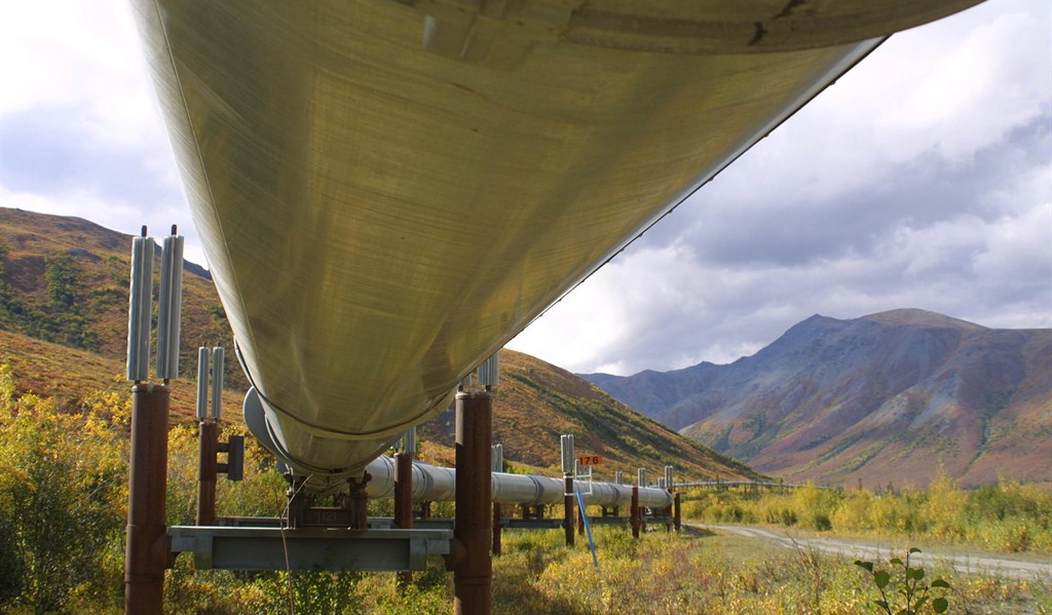Alaska is a big place. A really big place. You can drop Texas, California, and Montana, the next three biggest states, into Alaska and have room left over for a Delaware or two. We have more coastline than the contiguous 48 has on both coasts. And, yes, there are places in the Aleutians where, on a clear day, you can see the Russian coast.
Alaska is also a state whose economy rests largely on three things: commercial fisheries, tourism (including hunting and fishing,) and extraction. The Alaskan oil fields provide a lot of jobs, including many in the native communities up north that otherwise would have few prospects. Almost everyone up here in the Great Land knows someone who is gone part of the year, working up on "the Slope."
It is, of course, the extraction part of our economy, specifically oil and gas production, that transformed Alaska in the '70s and which is under assault today.
Over at RealClearEnergy, Jason Isaac eloquently lays out the case why fossil fuels are not only responsible for the modern, developed state of our world but also for its continued growth.
In fact, we have fossil fuels to thank for the twenty-first century for being the best time in human history to be alive. Unfortunately, it’s the best-kept secret in our world today.
If we really want to earn “our children’s trust,” we should teach them the truth instead of foisting crippling and needless anxiety on an entire generation.
Contrary to the attention-grabbing clips of forests burning and shock-inducing statistics about record-high temperatures, modern climate science suggests that warming is likely to remain mild and manageable while our resilience continues to improve. In fact, despite average global temperatures increasing about 1° Fahrenheit and our population quadrupling in the last century, climate-related disasters claim 99% fewer lives. Our resistance to severe weather events (which actually have remained consistent or even declined in recent decades) is actually growing at a faster rate than non-weather-related natural disasters like volcanoes and earthquakes. The alarmists want you to believe a changing climate is jeopardizing human lives; however, the opposite is true.
But it is in the name of climate change that now, an ill-advised group of climate scolds is trying to shut down one of America's key domestic energy sources by agitating to close the Alaska Pipeline.
A coalition of environmental groups has filed a legal petition with the federal government to reconsider how the Trans-Alaska Pipeline System contributes to climate change and to begin phasing the 800-mile line out of existence.
The government first authorized the pipeline right-of-way across federal land in the 1970s, sparking an economic boom that transformed the state. The government reauthorized the pipeline in 2002. But a lot of new information about climate change has come to light in the past two decades that merits a reconsideration, the groups say.
“The federal government has a lot of both responsibility and authority to address the climate crisis, and that’s what we’re asking that they do,” Kay Brown, Arctic policy director for Pacific Environment, said in a phone interview.
Alaska's Governor Dunleavy had the best response, and I will not try to top it:
Gov. Mike Dunleavy responded with derision on social media. He called the petitioners “nuts” and accused them of wanting to destroy Alaska more than they want to protect the environment.
This issue, of course, arises at a critical time, when it's in the United States' best interest to increase, not decrease, domestic production. As I reported on Thursday, there has been a major event that will almost certainly adversely affect the American economy and our access to this strategic resource.
Previously on RedState: So Long, Petrodollar: US-Saudi Arabian Agreement Ends After Fifty Years
In other words, this is not the time to be messing about with something that we need, and that is already working.
Alaska alone, as of this writing, produces a little over 400,000 barrels of oil per day, along with 3.5 trillion cubic feet of natural gas since exploration has started, although much of Alaska's natural gas production is used very close to the extraction point — and if you had been through a North Slope winter, you'd know why. At present, the recoverable reserves include 3.2 billion barrels of oil and 100 trillion cubic feet of gas. And that petroleum, of course, mostly comes down the pipeline to Valdez, where it is shipped to refineries in the lower 48. Now, many of Alaska's oil fields are mature, and production is slowing, but the Biden administration has shut down any further exploration, in large part to appease these same climate scolds. Democrats in general, even Alaska's own Congresswomen Mary Peltola (D-AK), are on board with this plan; and one would think that if any Democrat would see reason on this issue, it would be Mary Peltola, who surely knows how much of Alaska's economy depends on this industry.
In summary, climate activists have the ear of the Biden administration and are pushing to shut down a major domestic energy source in favor of "green energy" horse squeeze, while the end of the petrodollar will almost surely knock the American energy industry into a cocked hat.
On this issue, as with so many others, the Biden administration is 1) incompetent and 2) willing to sacrifice jobs in flyover country to meet a political agenda that has little or no founding in facts.
See Related: Alaskans Challenge Biden Administration's Cancellations of ANWR Leases
Granted, petroleum is a fungible commodity with a global price. Like any commodity, it does respond to supply and demand; increases in supply will lower prices, while increases in demand without matching increases in supply will drive prices upward. The end of the petrodollar deal, however, will almost certainly result in a weakened dollar and less ability for the U.S. to purchase oil abroad, thus making our own domestic production even more vital.
It wasn't that long ago, after all, that the United States was a net energy exporter.
Most Americans have the energy issue brought home when they have to fill their car or truck with gasoline or look at their home heating bill. Climate change, on the other hand, barely shows up in surveys of what troubles American voters in this election year. But, while it's likely that the pipeline effort will come to naught, the availability of energy, cheap, reliable energy, the energy that powers our economy, deserves the attention of every American.
Nobody wants dirty air or water. That is, however, a battle which we have already won. To come back around to Jason Issac's report, this is one of the best times in human history to be alive, and it's largely because of fossil fuels.
Meanwhile, this is the best time in human history to be alive, thanks largely to widespread access to affordable, reliable energy. Children today have a far greater chance of living a long, healthy, fruitful life than ever before. Around the world, in both developing and developed nations, poverty has plummeted and people are enjoying the tangible, life-improving benefits of lower infant and child mortality, better nutrition, improved education, lower infectious disease rates, more economic opportunity, gender equality, and longer lives. It’s no coincidence that global quality of life spiked and has continued to improve consistently since the Industrial Revolution — or that communities without access to electricity are still plagued by poverty, danger, and disease.
There's no reason to backtrack on this. Yes, the climate changes. It always has. It always will. Throughout most of the history of the Earth, it's been warmer than it is now — sometimes a lot warmer. Do humans have an effect? Well, sure; everything has some effect on everything else. But there are factors that we can control and those which we cannot, and the factors we can't change — like the sun — are the greater. Crippling our energy sector now, and at this critical juncture, is a bad idea. Hopefully, voters will remember that in November.













